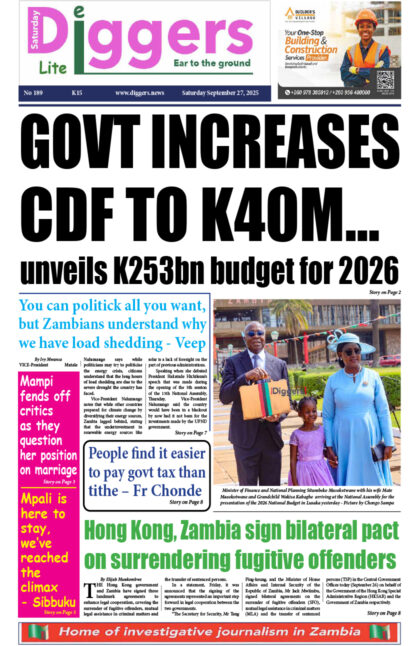President Edgar Lungu did not ask his Turkish counterpart Recep Tayyip Erdoğan for Zambia’s US $750 million Eurobond to be refinanced, but he just let him know that one of the firms from his country may buy Zambia’s sovereign debt, says Amos Chanda.
And Chanda says Zambia may not have been able to build a Sinking Fund because electricity imports and cholera, as well as the fall army worms, almost disrupted everything as they took a huge chunk of resources.
Meanwhile, Chanda says it is normal practice for Heads of States to take interest in their respective private sectors.
According to a posting in his WhatsApp post in a group dubbed: ‘the press,’ Chanda, the Special Assistant to the President for Press and Public Relations, insisted that the Head of State did not beg President Erdoğan, but was just informing him that one of the firms from his country may buy Zambia’s US $750 million Eurobond debt.
“What this announcement by HE does is to inform the public and the market players of our intention to manage the debt. With this process there will be no anxiety in the market; no one has and will lose any money. The bond holders for the $750 million are getting their interest payments without any default whatsoever for the past six years,” Chanda said.
“They will continue to get and when a new bond holder from Turkey or anywhere else comes through, the Eurobond holders will get their $750 million bullet payment and new loan terms far below the current 9 pc [per cent] will be negotiated with a longer repayment tenor; this will free up cash for social sector spending and completion of stalled projects; what is the noise about the word “refinancing”? And, moreover, the President did not ask for Turkish aid over bonds, but to let his distinguished guest know that a Turkish firm may just buy our sovereign debt; this is normal practice for Heads of State to take interest in their private sector.”
And he stated that Zambia may not have been able to build a Sinking Fund because electricity imports and cholera, as well as the fall army worms, almost disrupted everything as they took a huge chunk of resources.
“We got three Eurobonds: (1) $750 million, (2) $1.250 billion, and (3) $1 billion. So, the total is $3 billion. The interest in some of the bonds was between 8 and 9, quite high, but not strange for open market commercial loans as opposed to bilateral or multilateral ones. The $750m is due for bullet payment in 2022. We are now laying interest and we have never defaulted. Refinancing means getting a new loan below the interest rate we are currently paying. We may not have been able to build a Sinking Fund because electricity imports almost disrupted everything during the drought; cholera and fall army worms also took a huge chunk; the President must be praised for his transparency on how we intend to handle the debt; there is no default or vulture funding arrangement at all,” stated Chanda.
Government, through former finance minister Alexander Chikwanda approved the establishment of a Loan Sinking Fund back in 2015 for the purposes of paying back the two Eurobonds successfully issued in 2012 and 2014 of US $750 million and US $1 billion respectively.
However, that same year, government went ahead to issue an unprecedented third sovereign Eurobond worth US $1.25 billion that has a three-year amortisation plan, with payments due during the 2025-2027 period, which will average just under US $500 million per annum.
Although the Sinking Fund has been established, the monetary sum of what government may have saved remains unknown.
The Zambian government will by 2027 be hit with a total amount of US $5 billion in interest and principal payments from all three Eurobonds or risk defaulting.























